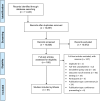A Systematic Review of Mental Health Professionals, Patients, and Carers' Perceived Barriers and Enablers to Supporting Smoking Cessation in Mental Health Settings
- PMID: 35018458
- PMCID: PMC9199941
- DOI: 10.1093/ntr/ntac004
A Systematic Review of Mental Health Professionals, Patients, and Carers' Perceived Barriers and Enablers to Supporting Smoking Cessation in Mental Health Settings
Abstract
Introduction: Evidence-based smoking cessation and temporary abstinence interventions to address smoking in mental health settings are available, but the impact of these interventions is limited.
Aims and methods: We aimed to identify and synthesize the perceived barriers and enablers to supporting smoking cessation in mental health settings. Six databases were searched for articles reporting the investigation of perceived barriers and enablers to supporting smoking cessation in mental health settings. Data were extracted and coded using a mixed inductive/deductive method to the theoretical domains framework, key barriers and enablers were identified through the combining of coding frequency, elaboration, and expressed importance.
Results: Of 31 included articles, 56 barriers/enablers were reported from the perspectives of mental healthcare professionals (MHPs), 48 from patient perspectives, 21 from mixed perspectives, and 0 from relatives/carers. Barriers to supporting smoking cessation or temporary abstinence in mental health settings mainly fell within the domains: environmental context and resources (eg, MHPs lack of time); knowledge (eg, interactions around smoking that did occur were ill informed); social influences (eg, smoking norms within social network); and intentions (eg, MHPs lack positive intentions to deliver support). Enablers mainly fell within the domains: environmental context and resources (eg, use of appropriate support materials) and social influences (eg, pro-quitting social norms).
Conclusions: The importance of overcoming competing demands on staff time and resources, the inclusion of tailored, personalized support, the exploitation of patients wider social support networks, and enhancing knowledge and awareness around the benefits smoking cessation is highlighted.
Implications: Identified barriers and enablers represent targets for future interventions to improve the support of smoking cessation in mental health settings. Future research needs to examine the perceptions of the carers and family/friends of patients in relation to the smoking behavior change support delivered to patients.
© The Author(s) 2022. Published by Oxford University Press on behalf of the Society for Research on Nicotine and Tobacco.
Figures


References
-
- Jochelson K, Majrowski B.. Clearing the Air: Debating Smoke-Free Policies in Psychiatric Units. London, UK: King’s Fund; 2006. https://www.kingsfund.org.uk/publications/clearing-air. Accessed March 3, 2020.
-
- Statistics OfN. Adult Smoking Habits in the UK: 2019. 2020. https://www.ons.gov.uk/peoplepopulationandcommunity/healthandsocialcare/.... Accessed April 15, 2020.
-
- Psychiatrists RCo. Smoking and Mental Health. London, UK: Royal College of Physicians; 2013. rcplondon.ac.uk/projects/outputs/smoking-and-mental-health. Accessed February 15, 2020.

